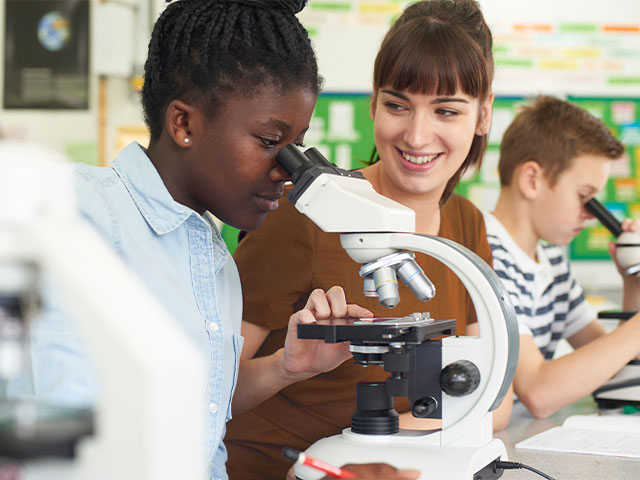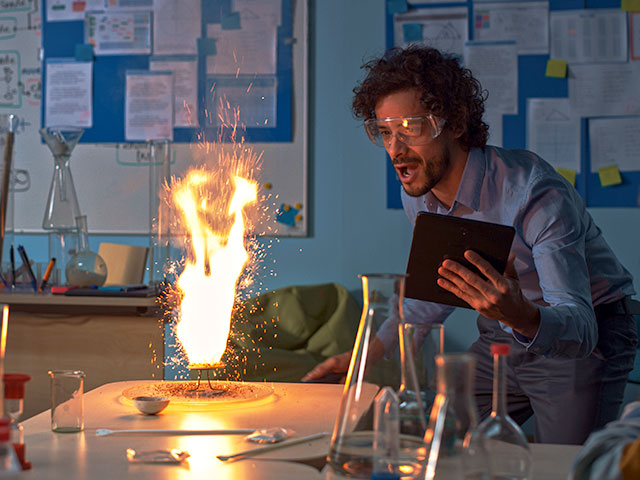Science Education (6-12)
ADMISSION REQUIREMENTS:
-
Students must have a grade point average (GPA) of 2.50 or better in basic general education course component OR a 2.50 GPA from a completed baccalaureate program.
-
Students must meet all “Gordon Rule” requirements.
-
Students must have a grade of “C” or better in the required courses taken as part of the General Education Preparation Program.
-
Students must successfully complete a criminal background check, have proof of medical insurance, liability insurance and a pre-admission interview by the College of Education Admissions Committee.

Our Programs/Concentrations
In addition to coursework, the program includes fieldwork, laboratory experiments, classroom observations, as well as teaching methodology. The capstone of the program is the student teaching experience (internship) during the final semester.
Designed to prepare candidates for careers as future Biology teachers in middle and high schools.
Designed to prepare candidates for careers as future Chemistry teachers in middle and high schools.
Designed to prepare candidates for careers as future Physics teachers in middle and high schools.
What is Science Education?
Science Education is a field of study associated with using observation, analysis, and experiments to teach, learn, and understand the structure and behavior of the natural and physical world around us.
Why should I consider majoring in Secondary Science Education?
If you are passionate about science and want to share this knowledge, you might want to consider becoming a science teacher. You might enjoy combining your passion for science with your love for children and young adults through a career in teaching.
A science educator should have impressive scientific reasoning skills and a broad understanding of earth science, animal science, biology, chemistry, or physics. They should also be up-to-date on the latest scientific developments and discoveries. Science educators should be able to teach students how to solve problems and gather evidence to support scientific ideas, hypotheses, and decisions. Good communication skills and a positive attitude are also essential.
What will I learn from studying Secondary Science Education?
Outside of their chosen program track courses (biology, chemistry, or physics), students majoring in our Science Education Program will also develop skills, concepts, and methodologies in the following areas:
Psychology with emphasis on behavioral phenomena, learning, motivation, personality adjustment, and assessment techniques; The history and development of the American education system from pre-school to higher education; Diversity for Educators, designed to enable candidates to work effectively in multi-racial, multi-cultural, and multi-ethnic communities; Philosophies of education; Public speaking, and more!
What career fields are related to Secondary Science Education?
| Public School Biology Teacher | Private School Biology Teacher | General Biology Teacher |
| Public School Chemistry Teacher | Private School Chemistry Teacher | General Chemistry Teacher |
| Public School Physics Teacher | Private School Physics Teacher | General Physics Teacher |
"Education’s purpose is to replace an empty mind with an open one."
GRADUATION REQUIREMENTS
Students seeking program completion from FAMU’s state approved Science teacher education program must successfully complete the following requirements:
- Complete admission to the Professional Teacher Education Program
- Complete all course work with the required cumulative GPA of 2.50
- Complete Student teaching experience
- Complete a portfolio which documents mastery of the Florida Educator Accomplished Practices (FEAPs)
- Pass General Knowledge Tests and all subtests of the Florida Teacher Certification Examination (FTCE)
- External evaluation of satisfactory teaching ability
- Internal evaluation of satisfactory teaching ability
Check out the Florida Teacher Certification Examinations (FTCE)
Contact Us
| Name | Phone | |
|---|---|---|
| Dr. Vanessa Pitts Bannister ASSOCIATE PROFESSOR |
vanessa.pittsbannister@famu.edu |
|
|
Dr. Edith Davis |
edith.davis@famu.edu | (850) 599-3038 |







